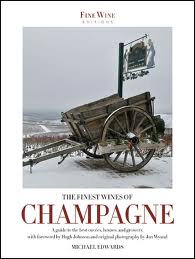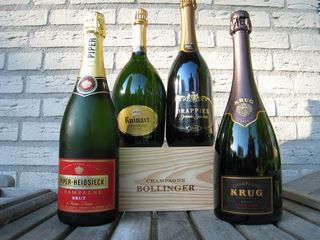Good quality sparkling wine is not only made in France these days, but all over the world. From New Zealand and Australia, via California to Italy and Spain. Champagne however is easily the most expensive of the lot. So why would you want to buy Champagne?
Obviously, it all depends on the occasion. If a large group of friends have come to visit, the temperature is 30 Celsius and everybody is outside talking and laughing and drinking, serving expensive champagne would be a bit of a waste. A young, fresh Cava from Spain would do admirably. Or a Prosecco from Italy perhaps? On the other hand, if you are trying to make a good impression on your in-laws, champagne is the obvious choice. In love and business it is indispensible. But these are all, if you will, external factors. Does the intrinsic quality of champagne warrant the extra money you have to pay for it?
It does. Picking the right one is what matters. There is a lot of very average champagne on the market that isn't worth your money or your while. The good stuff however is still in a class of its own. If you will allow me, I will first briefly explain why and then give you some top tips - personal favourites of mine.

Good to great champagne stands out among sparkling wines because of a combination of five defining factors: climate, soil, grape varieties, bottle fermentation and bottle ageing. I won't bore you with all the details - if you're interested I can recommend two excellent books: the World Encyclopedia of Champagne & Sparkling Wine by Tom Stevenson (Absolute Press, 1998; a new edition is expected April 2011) and The Finest Wines of Champagne by Michael Edwards (Aurum Press, 2009). The short version is this:
- Cool climate gives the grapes a high acidity and bags of flavour after the long growing season;
- Chalky soil provides the wines with an exciting minerality;
- Top-quality red and white grape varieties (Pinot Noir, Pinot Meunier and Chardonnay) give the wine structure, fruit and aroma;
- The second fermentation, which makes the bubbles, takes place in the bottle. This produces finer and smoother bubbles than any other method;
- Bottle ageing in the cellars of a quality-conscious producer after the second fermentation for at least three to four years (the legal minimum for non-vintage champagne is 16 months) adds essential yeasty, toasty complexity.
Take any one of these factors away and some of the quality will be lost. The point is that hardly any other sparkling wine combines them all .
Now for the top tips. These days there is nothing wrong with big brands like Moët & Chandon or Veuve Clicquot. You can buy them with confidence. But for price-quality Piper-Heidsieck Brut gets my vote. Michael Edwards writes: "Vital, green-tinted hue; a marked citrus character (...); tight, dynamic, mid-weight, clean, pure and frank (...). An excellent Champagne for contemporary tastes." Yummie. And considerably cheaper than most of the other major brands.
Another favourite is Drappier. The vineyards of the house of Drappier are located in the Côte des Bar, a separate area of Champagne southeast of the heartland of Champagne. The Carte d'Or Brut is round and supple, with flavours of little red fruits, in a lovely, less austere style. All their wines are very good, but their prestige cuvée "Grande Sendrée" is probably the greatest steal in all of champagne. It is truly great and in Holland it sells for less than € 50 - not very much more than the standard champagne of many of the major brands. If you can still find the 2002, buy all you can (I did!) but you won't be disappointed with the current 2004 vintage either.
For ultimate finesse I would recommend any of Ruinart's wines - elegance personified. Its Brut is our house champagne. For Rosé go for Billecart-Salmon, quite expensive but so lovely and perfect for romance - its elegant bottle is as charming as the wine.

Finally a word about prestige cuvées. Krug, Cristal, Dom Pérignon and the likes. Yes, usually they are truly great - with a price tag to match. I happily admit to owning and drinking them. But in truth they are not for the uninitiated. If you really want to appreciate their greatness and put them in context, you need some experience with slightly simpler wines. But they will surely impress the in-laws!
Xavier Auerbach












